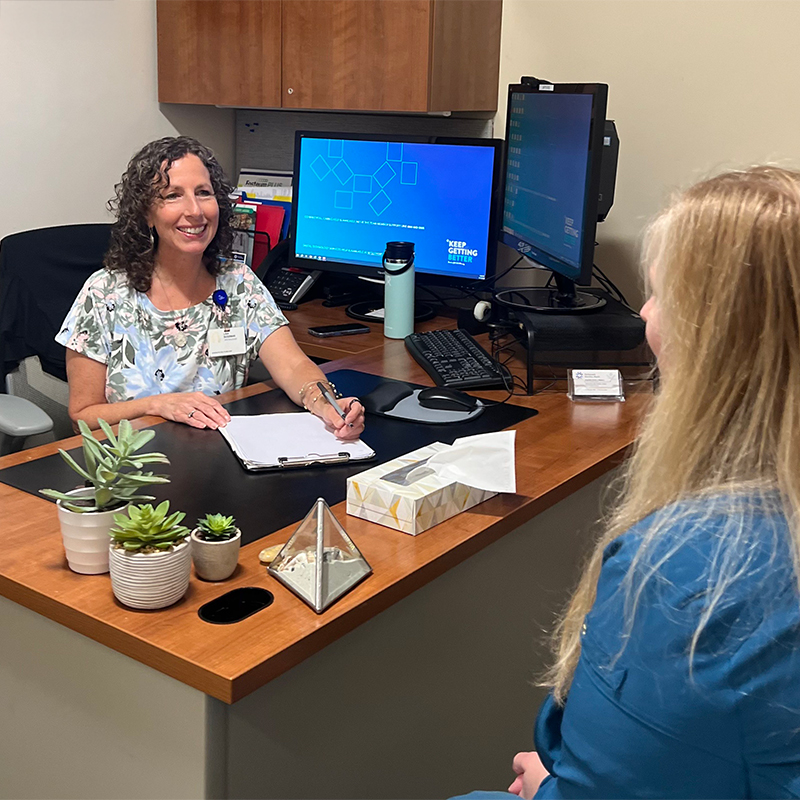Health Psychology
Mind and Emotion Support as Part of Whole-Person Care
Hackensack Meridian Health provides expert health psychology services across New Jersey, delivering evidence-based behavioral support for stress, chronic conditions, and emotional wellness. Patients in North, Central, and South Jersey can access nationally recognized behavioral medicine specialists close to home. As New Jersey’s #1 ranked health network by U.S. News & World Report, we combine psychology, integrative care, and clinical expertise to support mental and physical health together.
What is health psychology?
Health Psychology focuses on identifying the factors that impact health and wellness and helping people to implement practices, behaviors and mindsets which promote physical and emotional health. These factors include biological, psychological, social, cognitive, spiritual and environmental components. These components interact with each other and influence both the risk of an illness and the body’s ability to heal.

What does a health psychologist do?
Health psychologists study these factors and their interactions on patients’ health, helping to enhance healing and recovery, maintain wellness and improve health, while preventing illness. A health psychologist supports a person to identify stressors and how these may impact their life as well as design an individualized treatment plan to learn stress-management techniques such as relaxation techniques, mindfulness and heart coherence. The goal is to build resilience to adversity and optimize health and well-being. The treatment plan may also include helping a person implement pro-health behaviors which are known to buffer against stress, prevent illness, and cultivate the body’s ability to recover from illness. These behaviors can include healthy sleep, an activity routine, a nutrition plan, cultivating gratitude, boosting the support system and engaging in meaningful activities.
Conditions & Issues Addressed
- Stress, anxiety, and emotional distress
- Depression or mood changes related to illness
- Coping with chronic pain or fatigue
- Adjustment to a new medical diagnosis
- Behavioral support for diabetes, hypertension, or heart disease
- Medication adherence and lifestyle change
- Sleep and insomnia problems
- Biofeedback and mind-body symptom management
How can health psychology benefit me?
The goal is to build resilience to adversity and optimize health and well-being. Stress and how we manage it is a risk factor that can lead to physical and mental illness. Stress has both direct and indirect impacts on our health. One example of the direct impact of stress on health is that the body’s chemical and physiological reactions to ongoing perceived stress decreases its ability to fend off illness. Indirectly, stress impacts our health in many ways such as affecting our sleep, how and what we eat, our ability to make decisions and how our time is spent with loved ones or activities we enjoy. Learning how to manage stress is just one example as to how health psychology services can benefit in the journey towards improved self care and greater health and well-being.
Health Psychology Treatment Plans
Dr. Sussman meets with individual adults every 2 to 4 weeks up to 8 sessions for a short-term episode of care.
Dr. Sussman uses several modalities such as cognitive-behavioral therapy (CBT), mindfulness, positive psychology, EFT, and other cognitive-somatic interventions. Dr. Sussman guides people in learning skills which not only help them adjust to their medical status, improve quality of life and change their mindset, but to shift into and maintain a lifestyle which promotes positive mind-body change, healing, and wellness.
Why Choose Hackensack Meridian Health
- Behavioral & Medical Integration: Psychology specialists who coordinate with your medical team
- Credentialed Experts: Licensed psychologists experienced in chronic illness, pain, and behavioral medicine
- Research-Informed Care: Techniques rooted in proven psychotherapeutic and behavioral science
- Convenient Access: In-person and virtual sessions available across New Jersey
- Patient-Centered Approach: Treatment plans tailored to your medical condition, beliefs, and life context
Specialties
- Reducing insomnia
- Adjustment to illness or life changes
- Learning skills to manage anxiety and stress
- Coping with chronic medical conditions and pain
- Creating lasting positive lifestyle changes










